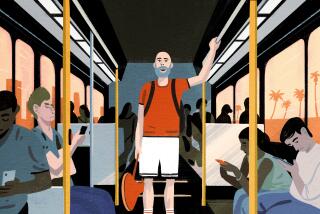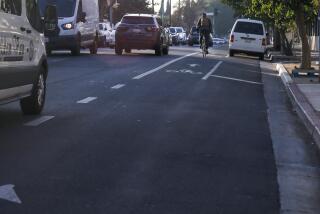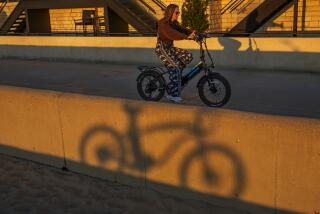L.A.’s long-term commute
Today, Gordon and Reed discuss what transportation projects L.A. officials ought to pursue over the long term. Previously, they debated the to convert some carpool lanes into toll lanes, the of building transit projects in Los Angeles, and the between growth, city planning and traffic.
Pricing means power over traffic
By Peter Gordon
When we do not price road access, we get congestion -- and then there are all the complaints and hand-wringing. And then we get bad ideas and policies. I have already written about the failure of big public transit projects to make a difference. After billions of dollars spent, transit use in the U.S. keeps falling. (There are the occasional upticks that transit advocates celebrate, but please, look at the 50-year trend.)
Yes, we have to build more roads, but the best way to do so is as a profitable business. We casually do a countless amount of shopping without worrying. We do not lose sleep over whether there will be goods at affordable prices in the morning; we rush to the mall on a regular basis, signaling our confidence that large numbers of strangers have seen to it that planning, investing, inventing, producing, packaging, transporting, warehousing and retailing have all been taken care of. It works so well that we do not even think about it. (Sure, there are always complainers. I would love it if The Times cost just a nickel and if my morning coffee cost, say, a dime.)
There are many who believe that they can redesign our cities and neighborhoods to ease highway congestion. They advocate “smart growth” that would cause us to drive less and walk and bicycle more. But such visions are just a dream, as we see no evidence that smart-growth policies have worked out this way anywhere. We do know that restrictions on development limit supply and raise prices, which brought on the housing affordability crisis. Those who have piled on regulations and restrictions never stopped to consider the cost. “Visions” without a proper cost-accounting cannot be taken seriously.
Most people cherish the freedom and mobility offered by the private auto; this is so obvious that I feel a bit silly saying it. All over the world, as incomes rise, people want their cars. Critics who have not bothered to look at auto use in other countries forget this. The Europeans got a late start not because of their great transit systems but because of the devastation of World War II.
As more people drive, they will have more range and more options. Origins and destinations disperse. And as they disperse, more people want their autos. It is self-reinforcing. There is only one intervention that will slow it down: Make driving and parking more expensive, which brings is back to tolling and pricing. There is really no choice.
Peter Gordon is a professor of real estate economics and public policy at USC.
Reliable transit is freedom
By Bart Reed
Peter,
Your argument on the future of L.A. transportation is smoke and mirrors and no content. You advocate the right to pay more but do not offer solutions for the area’s world-class congestion. Road access has always been constrained. Only 6,600 vehicles can pass through four highway lanes during rush hour. After that, it is all at a standstill. So your theory that we charge Group A a fee for free-flow access while an overwhelming and ever-increasing Group B continues to jam up the rest of the lanes doesn’t wash. Also, your claim that 1.5 million daily bus and rail rides don’t make a difference completely ignores the 40% transit ridership growth since 2000. You complain about how we’ve spent billions on transit, yet continue to ignore the trillions spent on roads.
Yes, we need to build more roads, particularly railroads -- urban and regional rail to move people and freight. Investment in that infrastructure is the future. Here are a few projects that will move passengers, freight and motorists, while saving time and improving air quality: the Alameda Corridor East, the Colton Crossing, the Gold Line down Interstate 210, the Downtown Regional Connector, the Purple Line subway to Century City, the Crenshaw and Green Line to the Los Angeles International Airport, the Harbor Subdivision to LAX, the Orange Line to Chatsworth, a San Fernando Valley to West L.A. rail line and 30-minute Metrolink service in L.A. County. Completion of these will build a mobile future.
In some cases we need new roads where tolls can be charged, such as the Interstate 710 tunnel beneath South Pasadena, the high-occupancy vehicle system on all Los Angeles County highways, the Riverside County express lanes along the 91 Freeway and the High Desert Corridor. Realistically, we aren’t going to build any more highways or roads in the core of Los Angeles.
The only way we can address these congested areas is by building smartly and increasing density along rail lines. Century City was built decades ago with the presumption of connecting rail. The rail never happened and, as a result, mobility in and around Century City has been a disaster. And there is nothing wrong with giving the free market opportunities to build at train stations to create livable, walkable “green” communities.
With an election coming in November, we need a strong plan and vision. We need to give voters a dynamic level of bus and rail “service” immediately: more frequencies, more hours, more weekend, evening and night service; and more service to jobs, schools, medical, sports, entertainment and cultural events. We need to give the voters something they can use immediately. Metrolink grew from zero to 45,000 riders in 16 years with relatively high fares, almost exclusively on service growth, while facing capacity issues. Southern Californians will use transit at a fair price, as reasonable fares make a huge difference in making funds available for operations and maintenance.
On the surface, you are correct, Peter, that cars give us freedom, but at what cost? True freedom gives the community transportation choices as to how to get where they need to go. I’m surprised that a libertarian such as you would deny the public the very liberties to invest and explore in these mobility choices and options. We need choice!
Bart Reed is executive director of the Transit Coalition, a Sylmar-based nonprofit organization dealing with issues of transportation, mobility and land-use planning.
| | | | Day 5
More to Read
A cure for the common opinion
Get thought-provoking perspectives with our weekly newsletter.
You may occasionally receive promotional content from the Los Angeles Times.






